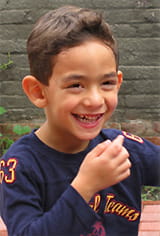 Article: The Fragile X Syndrome: Speech and Language Characteristics
Article: The Fragile X Syndrome: Speech and Language Characteristics
Most children affected with Fragile X Syndrome will have some form of speech/language delay. Because they do not speak in short phrases until 2 1/2 years of age, these children are often referred to a speech/language pathologist before a diagnosis of Fragile X is made.
This article discusses:
- Cognitive characteristics of children with Fragile X
- Sensitivity to sights, sounds, movements, touch, smells and tastes
- Strategies for addressing speech and language deficits
Read The Fragile X Syndrome: Speech and Language Characteristics »
Article: Toilet Training the Child with Fragile X Syndrome
Toilet training a child with Fragile X Syndrome will probably take longer than usual. The length of time it takes will depend on the child’s motor or muscular difficulties, the child’s awareness of his or her body and sensations, as well as the level of mental retardation or other cognitive deficits.
This article discusses:
- Guidelines and suggestions for toilet training
Read Toilet Training the Child with Fragile X Syndrome »
Article: Managing Attention Deficit Hyperactivity Behaviors in Children with Fragile X Syndrome
Children with Fragile X Syndrome are often friendly, social, active children who are quick to learn by watching others. They have strong visual problem-solving abilities and are often very verbal and outgoing. Children with Fragile X Syndrome also present with a number of challenging characteristics. We know of cognitive deficits ranging from learning disabilities to severe mental retardation; communication difficulties; a hypersensitivity to visual, auditory and tactile stimuli; and attention problems, including hyperactivity and impulsivity.
This article discusses:
- Strategies for managing behaviors
Read Managing Attention Deficit Hyperactivity Behaviors in Children with Fragile X Syndrome »
Article: Treatment of Aggressive Behavior in Children and Adolescents with FXS
Aggressive behavior is often associated with individuals with Fragile X Syndrome. Although fairly common, it is often misunderstood. The aggressive behavior is usually described as being violent and unpredictable. This reactionary and impulsive behavior frequently results in serious infractions. In order to address a behavioral remedy, it is important to understand the function the behavior plays in the sequence of the episode.This article discusses:
- Behavior assessment
- Proactive strategies for addressing behavior
Read Treatment of Aggressive Behavior in Children and Adolescents with FXS »
Article: Treatment of Aggression in Children and Adults with Fragile X Syndrome
Aggression is a relatively common problem in children and adults with Fragile X Syndrome. It is related to problems with impulsivity, over-reactivity to stimuli and mood instability. In childhood, impulsive hitting when the child becomes angry, upset or overwhelmed occurs in approximately 40 percent of cases. Usually, behavioral interventions, including a negative verbal response with subsequent timing out and then positive reinforcement for not hitting, will extinguish such behavior. If problems persist, then work with a behavioral psychologist on a weekly basis is warranted.This article discusses:
- Strategies for addressing aggression, frustration, anxiety and more severe mood instability
Read reatment of Aggression in Children and Adults with Fragile X Syndrome »









 Article: The Fragile X Syndrome: Speech and Language Characteristics
Article: The Fragile X Syndrome: Speech and Language Characteristics